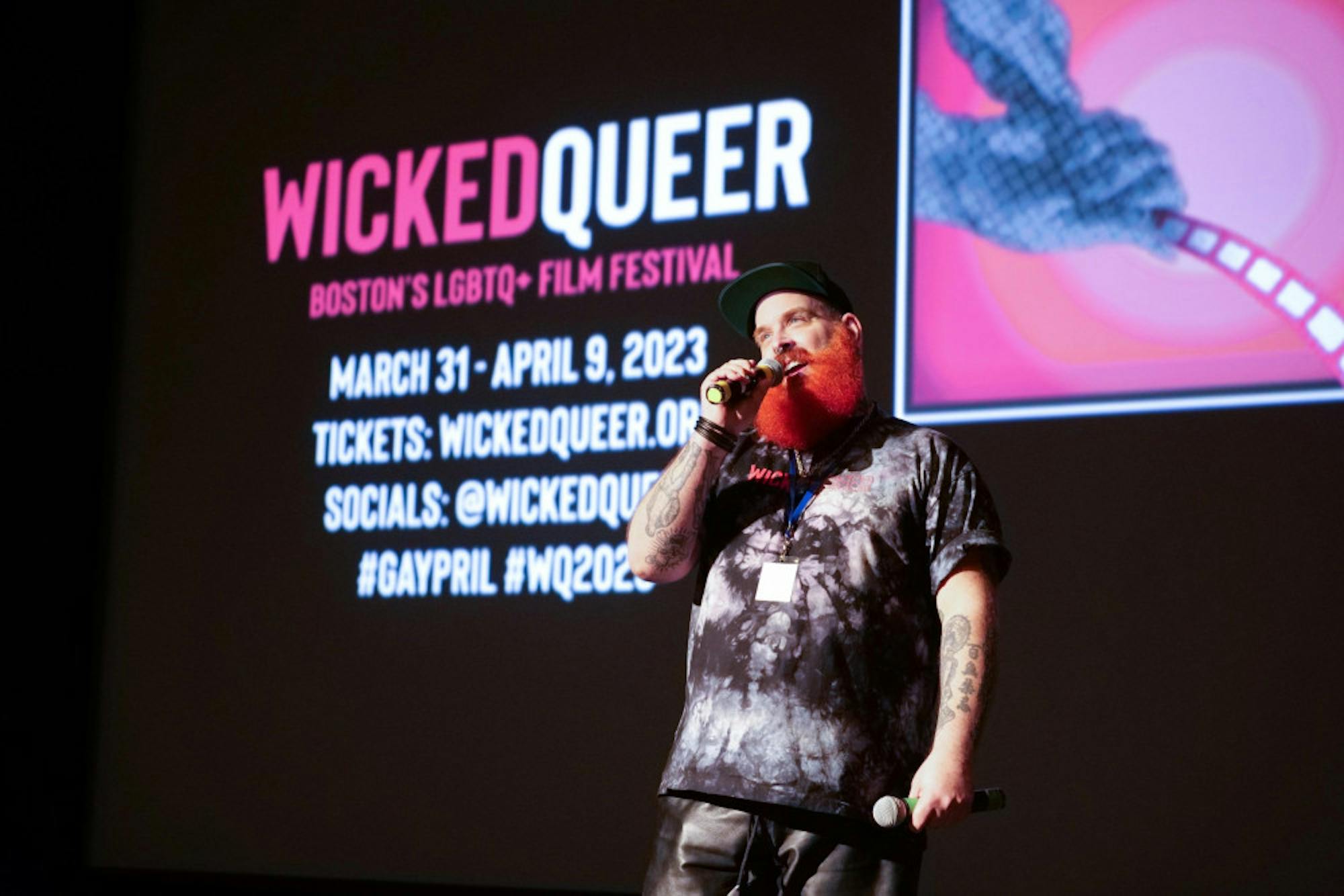From March 31 to April 9, queer cinema invaded theaters across the Boston area. From bigger venues like the Museum of Fine Arts and the Institute of Contemporary Art to smaller film locales like the Brattle Theatre, Wicked Queer film festival put LGBTQ+ stories on the silver screen. With feature films and shorts alike, the festival provided a rare opportunity for queer filmmaking to take the spotlight.
Founded in 1984, Wicked Queer is the fourth longest-running LGBTQ+ film festival in North America. Formed by local film programmer George Mansour, the festival is run by an army of volunteers coming together with a singular mission: to make a home for queer cinema in Boston.
Shawn Cotter serves as the festival’s executive director. Cotter reflected on the founding of Wicked Queer, and how the festival made its way to 2023.
“I always tell people, our festival really started with a glory hole,” Cotter said. “[Mansour] started booking the gay adult films there … and put a glory hole in the bathroom [of the theater], and he realized that after that glory hole went in there, their sales revenue went up $1,000 a day.”
Now, Wicked Queer is able to screen a broad variety of films, from documentaries to dramas to comedies. No matter the style or genre of the film, they are all undeniably queer.
“I consider myself a queer propagandist. I want to celebrate queer lives, queer histories, and make sure that our stories are not being shoved to the bottom of Netflix or HBO Max,” Cotter said. “I’m tired of straight people, I’m tired of their stories, I’m tired of their illusion of control over us.”
In curating the festival’s film offerings, Cotter was intentional in telling a multitude of stories. This includes centering trans and nonbinary individuals, especially in light of recent drag bans across the United States.
“In conversation with what’s going on in the country, I want to shove drag down people’s faces,” Cotter said. “I want to shove trans stories down people’s faces.”
Curating a diverse film festival also means digging through the archives of queer cinema, and often means running into problematic or untimely films. This year’s festival featured 1991’s “Daddy and the Muscle Academy,” a documentary that Cotter believes likely would be crafted differently in the modern landscape.
“[What] interests me is to not only celebrate the new … but also revisit our histories. What can we learn from it? Is it cringy? How does it read in 2023?” Cotter said. “We’re never going to learn from our histories unless we unpack it a little bit.”
Wicked Queer also works hard to center LGBTQ+ filmmakers from across the world. Among these creatives was Steph Farber (LA’14), a Jewish lesbian filmmaker. Farber’s short film “Digital Warfare” (2023) was featured among the festival’s comedy shorts.
Presented with nine other comedy shorts at the Paramount Center, “Digital Warfare” follows two sisters fighting over whose turn it is to refill their popcorn bowl. What ensues is a dramatic, farcical thumb-wrestling battle.
“I have a weirdly strong thumb muscle and I don’t really know why,” Farber said. “Because of that, I was like, oh, wouldn’t it be really fun if there was this movie about someone who was in this underground thumb wrestling ring?”
This singular vision has taken Farber to a multitude of festivals and showings, ultimately returning to Boston for one of the short’s final screening opportunities. For Farber, this was a sort of homecoming.
“It was really nice to walk through some of the familiar spaces from when I lived here, but also have this entirely new experience and reason to be here,” Farber said. “It’s a very powerful thing to be back in an old space as a new version of yourself.”
Farber, who majored in English at Tufts, didn’t begin experimenting with filmmaking until long after college. Her advice for aspiring creatives? Start now.
“Do the things that scare you while you have the resources of your college to help you to support your dreams,” Farber offered. “I let myself feel really intimidated by a lot of things that I did not need to feel intimidated by. And so, don’t feel intimidated, just do the things.”
Though this year’s festival may have passed, Cotter and all those at Wicked Queer are looking forward to future programming. This includes an upcoming documentary festival, as well as their next annual celebration, which will usher in Wicked Queer’s 40th anniversary. Even as they celebrate 40 years, Wicked Queer’s mission stays the same: creating community.
“There are spaces for us, which are bars, but not everyone is interested in drinking. I think that, if we can gather in places that offer a space for everybody, I think that that’s something that we’re missing,” Cotter said. “Anytime that we can get together and gather and dialogue I think is important and revolutionary.”






